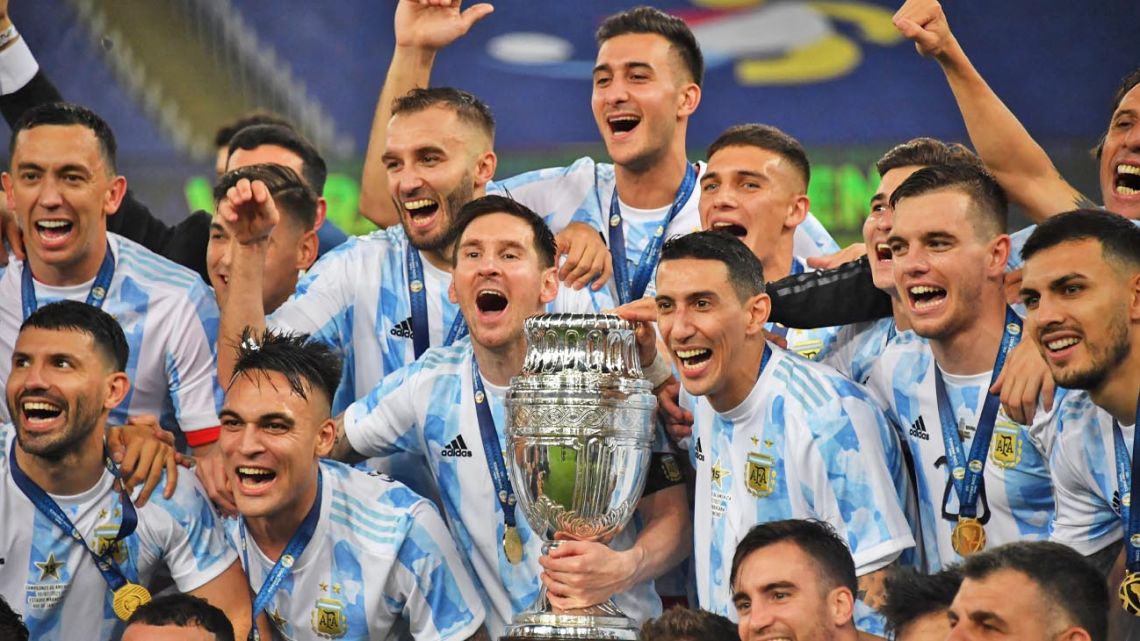
Twenty-eight years of hurt, seven final heart-breaks: all came to an end within a space of a matter of seconds. As referee Esteban Ostojich blew for full-time in the Estadio Maracanã in last week’s Copa América decider, Argentina could finally celebrate the trophy that had proved so elusive for almost three decades – and against no lesser a rival than mighty Brazil, in the holders’ own backyard.
The celebrations may have been rather short for a couple of Argentina’s Copa América winners, namely River Plate pair Franco Armani and Gonzalo Montiel, who by Wednesday were back in action for their club in the Copa Libertadores, but they were suitably raucous and emotional for a team that has suffered so much in their pursuit of silverware.
For the Argentine public back home too, which has lived under the shadow of a pandemic which this week claimed its 100,000th local victim and which has also suffered two immense losses in the world of football, in the great Diego Maradona and 2014 World Cup finalist, the much-loved and admired Alejandro Sabella, victory represented a rare moment of joy in these troubled times, and pride in a group of players who came together against all odds in Brazil to take the title.
Just a Copa América? Even with all the problems surrounding it, the last-minute venue changes and the constant spectre of Covid, this win meant so much more than that to everyone involved.
The headlines, both in Argentina and across the globe, focused on one player in particular. Lionel Messi had been involved in four of those last final setbacks, and after dominating the Copa from start to finish – a much-shared graphic in the past week shows the Barcelona man leading his peers in almost every comparison imaginable, from goals and assists to passes inside the area – he broke down in tears as that remarkable curse was finally broken. It is a mark of the esteem in which his team-mates hold their captain that as the final whistle blew, every one of them ran to embrace him, while even opposite number Neymar made a point of congratulating the little wizard amid the frustration of finishing on the losing team.
Such was Messi’s commitment to the cause that he was the only Argentina player to play every minute of the Copa, even when his 34-year-old body was crying out for a rest.
“The last few games he played in poor condition, but he gave everything for the team,” coach Lionel Scaloni, who became the first Albiceleste boss to win a major title since Alfio Basile back in 1993, told reporters.
“He deserved this Copa for all the effort he put into playing the semi-final and final while in poor physical condition. A lot of things don’t go public, but if many Argentines knew how he played and everything Leo gave of himself they would love him even more.”
Football of course never stands still. Just as Armani and Montiel have already been put through their paces in the Libertadores, and tomorrow return to Primera División action at home to Copa Liga Profesional winners Colón, so thoughts in the Argentina camp will soon turn away from Brazil and towards the Middle East.
Having seen his credentials questioned even as Argentina fought through the tournament, Scaloni now looks set to take the team he has so lovingly crafted (even with mistakes along the way) to Qatar in less than a year and a half’s time. That trip now feels much less daunting than prior to the Copa, as the national team has shown it can take on and beat one of the strongest sides in the world, whose last competitive defeat occurred more than three years previously.
Above all, this 2021 vintage is a squad with a shining future ahead of it. Aside from Messi, match-winner Ángel Di María and defender Nicolás Otamendi, all of Argentina’s starting line-up in the Maracanã was aged under 30, and will be at its very peak in time for the World Cup. Optimism is often a dirty word around Argentine football, so accustomed to self-deprecation and lamentation; but there is room for hope – especially if the nation’s little No. 10 continues to defy the years with his wizardly, almost extra-terrestrial talents.

